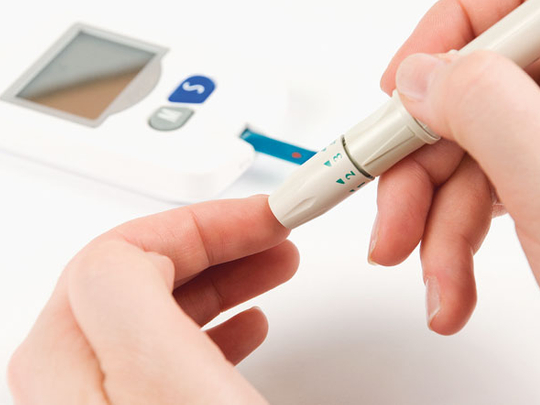
Dubai: A revolutionary new non-invasive procedure to reverse diabetes is one of the highlights in the bouquet of sophisticated treatments that the King’s College Hospital London’s clinic, which opened in Dubai on Thursday, offers to UAE residents.
Talking about the new procedure, Dr Rahila Sarwar Bhatti, consultant endocrinologist at KCH’s Dubai clinic told Gulf News: “The new device is called EndoBarrier which is a small tube that is endoscopically placed in the upper part of the small intestine for a year. The tube cuts down the nutrients’ [long] transit time, which in diabetics hampers the production of the hormone GLP 1 (Glucagon Like Peptide), a hormone produced in our gut that not only suppresses appetite but is a trigger for insulin production. The production of GLP I is impaired in diabetics. But with the tube, the nutrients quickly reach the lower part of the small intestine and the large intestine and signals a feeling of fullness quickly.”
HbA1c or glycated haemoglobin
King’s College Hospital London had conducted a study using the EndoBarrier in two different locations of the UK with multi-cultural subjects last year and it was found that in case of one-third of the diabetic patients in the study, they were able to get off insulin and the HbAIc of most under studies came down to 5.8 to 6 points.
HbA1c or glycated haemoglobin is an indicator of an individual’s blood sugar levels for three months. The haemoglobin protein in our red blood cells combines with a molecule of glucose and turns into glycated haemoglobin. In non-diabetics, HbA1c is between 5.2 to 5.5, it is about 5.5 to 6 in pre-diabetics and in cases of people with diabetes, the HbA1c reading can be anything beginning from 6 up to 14. The higher the HbA1c the more severe is the diabetic condition of the patient.
Dr Bhatti also added that the clinic would also have other procedures such as ‘scorching’ of the duodenal mucosa to trigger regeneration of the lining which has been found to be very effective in managing diabetes.
These treatments will begin in 2018 at the KCH Abu Dhabi clinic with skilled UK consultants such as Dr Bu Hayee, a pioneer in these endoscopic procedures. “Consultations for the procedures will begin in end 2017 and those found suited for the procedures will go ahead with it in our Abu Dhabi clinic,” said Dr Bhatti.
Consultation for diabetes
The new clinic, inaugurated by Humaid Al Qutami, director-general of the Dubai Health Authority (DHA), will have consultation for diabetes, family medicine, obstetrics and gynaecology, ENT, dermatology, paediatrics, rheumatology, liver and biliary disease, dermatology, dentistry among others.
Dr Simon Fraser, medical director of KCH in the UAE, said: “Keeping up to the heritage of KCH London, the clinic will follow an evidence-based, ethical practice where we do not over-investigate, over-medicate or over-treat a patient. Our rate of prescribing diagnostic tests is 0.5 per cent of the total blood tests clinics normally prescribe; very often our patients leave without any prescription and we are confident of reducing the country’s health expenditure drastically.”
Neil Buckley, CEO of KCH UAE, added: “We have three core health-care concepts that we are launching for the UAE market; the London Faculty, the London Neuroscience Academy Programme and the Multi-Disciplinary Case Review Boards. The London Faculty gives access to a large pool of the world’s best clinicians from the UK who are an integrated part of our patient pathway and who will be in the UAE every four to six weeks. During the intervening period, their day-to-day involvement with our UAE’s doctors and patients is maintained through telemedicine and through our local KCH clinicians.”












